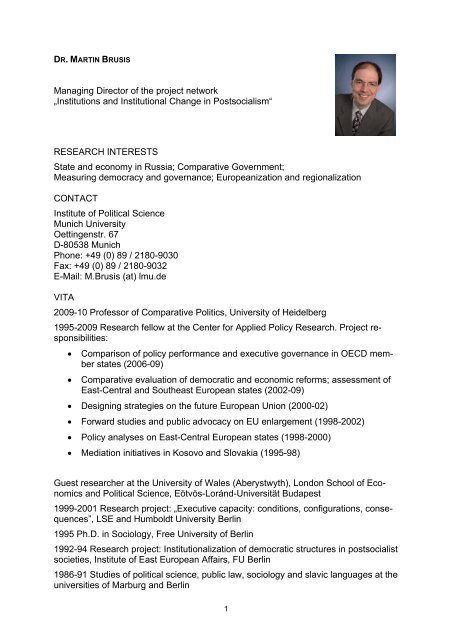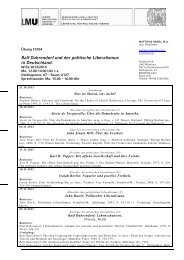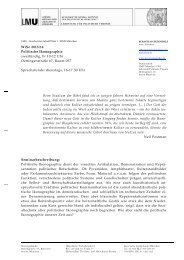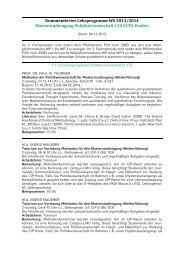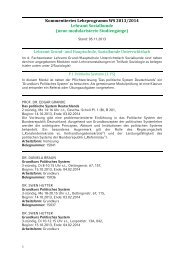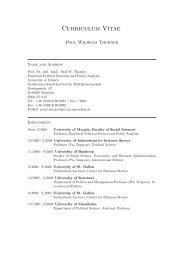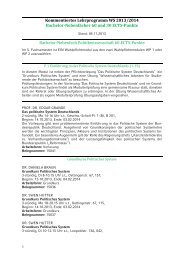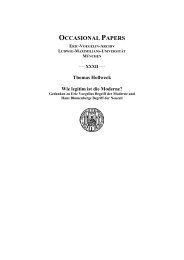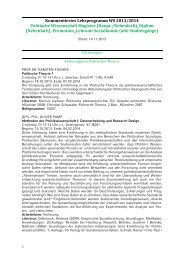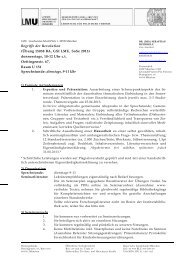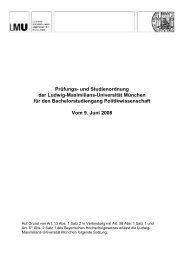CV English - LMU
CV English - LMU
CV English - LMU
You also want an ePaper? Increase the reach of your titles
YUMPU automatically turns print PDFs into web optimized ePapers that Google loves.
DR. MARTIN BRUSIS<br />
Managing Director of the project network<br />
„Institutions and Institutional Change in Postsocialism“<br />
RESEARCH INTERESTS<br />
State and economy in Russia; Comparative Government;<br />
Measuring democracy and governance; Europeanization and regionalization<br />
CONTACT<br />
Institute of Political Science<br />
Munich University<br />
Oettingenstr. 67<br />
D-80538 Munich<br />
Phone: +49 (0) 89 / 2180-9030<br />
Fax: +49 (0) 89 / 2180-9032<br />
E-Mail: M.Brusis (at) lmu.de<br />
VITA<br />
2009-10 Professor of Comparative Politics, University of Heidelberg<br />
1995-2009 Research fellow at the Center for Applied Policy Research. Project responsibilities:<br />
<br />
<br />
Comparison of policy performance and executive governance in OECD member<br />
states (2006-09)<br />
Comparative evaluation of democratic and economic reforms; assessment of<br />
East-Central and Southeast European states (2002-09)<br />
Designing strategies on the future European Union (2000-02)<br />
Forward studies and public advocacy on EU enlargement (1998-2002)<br />
Policy analyses on East-Central European states (1998-2000)<br />
Mediation initiatives in Kosovo and Slovakia (1995-98)<br />
Guest researcher at the University of Wales (Aberystwyth), London School of Economics<br />
and Political Science, Eötvös-Loránd-Universität Budapest<br />
1999-2001 Research project: „Executive capacity: conditions, configurations, consequences”,<br />
LSE and Humboldt University Berlin<br />
1995 Ph.D. in Sociology, Free University of Berlin<br />
1992-94 Research project: Institutionalization of democratic structures in postsocialist<br />
societies, Institute of East European Affairs, FU Berlin<br />
1986-91 Studies of political science, public law, sociology and slavic languages at the<br />
universities of Marburg and Berlin<br />
1
SELECTED PUBLICATIONS<br />
1. Articles in refereed journals<br />
The Quality of Democracy and Market Economy in Southeast Europe, in: Südosteuropa 57 2/3 2009<br />
146-167.<br />
Konzepte, Messansatz und Validierung der Sustainable Governance Indicators, Zeitschrift für Politikwissenschaft<br />
19 4 2009, 537-551.<br />
Reformfähigkeit messen? Konzeptionelle Überlegungen zu einem Reformfähigkeitsindex für OECD-<br />
Staaten, in: Politische Vierteljahresschrift 49. 1/2008, 92-113.<br />
(Forthc.) European Union Incentives and Regional Interest Representation in Central and East European<br />
Countries, in: Acta Politica.<br />
Evidence of convergence? The Western Balkan Countries in Democracy and Governance Assessments.<br />
Southeast European and Black Sea Studies 8 4 December 2008 379-397.<br />
The Instrumental Use of EU Conditionality: Regionalization in the Czech Republic and Slovakia. East<br />
European Politics and Societies 19 2/2005, 291-316.<br />
Europeanization, Party Government or Legacies ? Explaining Executive Governance in Bulgaria, the<br />
Czech Republic and Hungary, Comparative European Politics 4 2/2004, 163-184.<br />
L’échelon regional en Europe centrale et orientale: Institutions, competences et resources. Revue<br />
d'Études Comparatives Est-Ouest 34 2/2004, 145-171.<br />
Regionalisierungsprozesse in Mittel- und Osteuropa. Institutionelle und fiskalische Aspekte regionaler<br />
Autonomie. Osteuropa-Wirtschaft 48 4/2003, 309-332.<br />
The European Union and Interethnic Power-sharing Arrangements in Accession Countries. Journal of<br />
Ethnopolitics and Minority Issues in Europe 1/2003, 1-20.<br />
Between EU Requirements, National Traditions and Competitive Politics: Re-creating Regions in the<br />
Accession Countries of Central and Eastern Europe. Governance. An International Journal of Policy,<br />
Administration and Institutions 15 4 October 2002, 531-559, republished in: Michael Keating (ed.):<br />
Regions and Regionalism in Europe. The International Library of Comparative Public Policy, Cheltenham/Northampton:<br />
Elgar, 2004, 612-640.<br />
Executive Configuration and Fiscal Performance in Post-Communist Central and Eastern Europe.<br />
Journal of European Public Policy 8 6/2001, 888-910 (Co-author: V. Dimitrov).<br />
Comparing Political Governance: Southeastern Europe in a Global Perspective. Southeast European<br />
and Black Sea Studies, 6 1 March 2006 (co-author: Peter Thiery).<br />
Assessing the State of Democracy, Market Economy and Political Management in Southeastern<br />
Europe. Southeast European and Black Sea Studies, 6 1 March 2006, 3-24.<br />
Serbia and Montenegro: Democratic Consensus Susceptible to Populist Actors. Southeast European<br />
and Black Sea Studies, 6 1 March 2006, 103-123.<br />
2
2. Monographies and edited volumes<br />
(Ed.) Strategic Policymaking in Central and Eastern Europe, Network of Schools and Institutes of Public<br />
Administration in Central and Eastern Europe, Bratislava 2008 (Co-editors: K. Staronova, R.<br />
Zubek).<br />
(Ed.) The State of Democracy, Market Economy and Political Management in Southeastern Europe,<br />
Southeast European and Black Sea Studies, 6 1/2006.<br />
(Ed.) Thinking Enlarged. The Accession Countries and the Future of the European Union, Europa<br />
Union Verlag, Bonn 2002 (Co-editor: J. Emmanouilidis).<br />
(Ed.) Macht der Mythen. Geschichtsstereotypen im slowakisch-ungarischen Verhältnis, Südosteuropa<br />
Sonderheft 9-10/1997, 118 S.<br />
Systemtransformation als Entscheidungsprozeß. Eine Politikfeldanalyse zur Privatisierung in Ungarn,<br />
Edition Berliner Debatte, Berlin 1995 (Dissertation).<br />
3. Articles in other journals<br />
Differential Patterns of Consolidation in View of European Union Membership: East-Central and<br />
Southeast Europe. Strategic Insights, Vol. IV, 12 (December 2005), www.ccc.nps.navy.mil/si/.<br />
Defects of democracy and options for institutional reform. Strategic Insights, Vol. IV, 12 (December<br />
2005), www.ccc.nps.navy.mil/si/ (co-author: Peter Thiery).<br />
Europa vor der Südosterweiterung? Europäische Rundschau 33 2/2005, 133-146.<br />
Die Vojvodina in der aktuellen Politik und Verfassungsordnung Serbiens, in : Südosteuropa 53 4/2005,<br />
573-586.<br />
Regierungskultur und Regierungspraxis. Am Beispiel Bulgariens, Tschechiens und Ungarns, Initial.<br />
Berliner Debatte 15 5-6/2004, 13-22.<br />
Von der Ost- zur Südosterweiterung? Die EU und der westliche Balkan. Osteuropa 53 11/2003, 1623-<br />
1638.<br />
Stand und Steuerung der Transformation: Ein Vergleich Südosteuropa – Ostmitteleuropa. Europäische<br />
Rundschau 31, 3/2003, 131-138.<br />
Was Demokratie fördert. Mittelosteuropa und Lateinamerika im Vergleich. Internationale Politik 58<br />
8/2003, 19-26 (Co-author: P. Thiery).<br />
Evropské budování státu? Evropská Unie a regionalizace v Ceské republice a ve Slovenské republice.<br />
[Europeanized State-Building? The European Union and Regionalization in the Czech and Slovak<br />
Republics] Správni právo [Administrative Law] 35 5-6/2002, 325-344.<br />
Vorschläge zur EU-Reform. Die Perspektive der Beitrittskandidaten, Internationale Politik 57. Jg.<br />
5/2002, 47-50 (Co-author: J. Emmanouilidis).<br />
Europäische und nationale Identität in den Beitrittsdiskursen Mittel- und Osteuropas. Forschungsjournal<br />
Neue Soziale Bewegungen 14 4/2001, 53-60.<br />
Eliten, Mobilisierungsmuster und Transitionspfade in Serbien. Südosteuropa 49 9-10/2000, 449-463<br />
(Co-author: W. van Meurs).<br />
3
Governance Capacity as a Key Factor in Preparing Accession to the European Union: A Survey of the<br />
Discussion. Perspectives 14 Summer 2000 40-52.<br />
Verhinderte Nationen. Über den Umgang mit ethnischen Minderheiten. Internationale Politik 54 9/1999<br />
(Co-author: J. Janning).<br />
Residuales oder europäisches Wohlfahrtsmodell? Die EU und die sozialstaatlichen Reformen in Mittelund<br />
Osteuropa. Prokla No. 114 29 1/1999, 73-94.<br />
Regelungsmöglichkeiten für Minderheitenkonflikte in Mittel- und Osteuropa. Ethnos – Nation 6 1-<br />
2/1998, 29-40.<br />
Ethnic Rift in the Context of Post-Communist Transformation: The Case of Slovakia. International<br />
Journal on Minority and Group Rights. 5 1/1997, 3-33.<br />
Minderheitenkonflikte in Osteuropa: Strategien und Instrumente. Europäische Rundschau 25 2/1997<br />
77-86.<br />
Die slowakische Verwaltungsreform unter minderheitenpolitischem Aspekt. Südosteuropa 46 3-4/1997<br />
197-212 (Co-author: V. Niznansky).<br />
Entstehungsbedingungen der ungarischen Arbeitslosenversicherung. Zeitschrift für ausländisches und<br />
internationales Arbeits- und Sozialrecht 9 3/1995, 336-368.<br />
Korporatismus als Transformationskonsens. Der Fall Ungarn im osteuropäischen Vergleich. Initial.<br />
Berliner Debatte 5 9/1994, 25-35.<br />
Privatisierungskonflikte in Polen, Ungarn und der ehemaligen CSFR. Überlegungen zu einer vergleichenden<br />
Analyse. Osteuropa 43 7-8/1993, 678-686.<br />
Systemwechsel und institutionelle Umgestaltung: Die Reform der ungarischen Sozialversicherung.<br />
Südosteuropa 41 9/1992, 528-545.<br />
4. Contributions to edited volumes<br />
Designing Sustainable Governance Indicators: Criteria and Methodology, in: Bertelsmann Stiftung<br />
(Ed.) Sustainable Governance Indicators, Gütersloh: Verlag Bertelsmann Stiftung 2009, 71-100.<br />
Sustainable Governance in the OECD – An Overview of Findings, in: Bertelsmann Stiftung (Ed.) Sustainable<br />
Governance Indicators, Gütersloh: Verlag Bertelsmann Stiftung 2009, 19-70 (Co-authors:<br />
Leonard Novy, Andrea Kuhn, Daniel Schraad-Tischler).<br />
(Forthc.) Accommodating European Union Membership: the Regional Level in Bulgaria, in: Europe,<br />
Regions and European Regionalism, ed. by Roger Scully and Richard W. Jones, Palgrave Macmillan.<br />
(Forthc.) Decentralization in the Czech Republic, in: From Localism to Intergovernmentalism. Changing<br />
Patterns of Central-Local Relations in Europe, ed. by Michael Goldsmith and Ed Page.<br />
(Forthc.) Czechoslovakia, in: European Regions: The Territorial Structure of Europe, 1870-2000, edited<br />
by Daniele Caramani, Peter Flora and Franz Kraus. Houndsmill, Basingstoke: Palgrave.<br />
Enlargement and Interethnic Power-sharing Arrangements in Central and Eastern Europe, in: The<br />
Protection of Minorities in the Wider Europe, ed. by Marc Weller, London: Palgrave MacMillan 2008,<br />
232-250.<br />
4
Governance Indicators and Executive Governance in Central and Eastern Europe, in: Strategic Policymaking<br />
in Central and Eastern Europe, ed. by Martin Brusis, Katarina Staronova, Radoslaw Zubek,<br />
Bratislava: Network of Schools and Institutes of Public Administration in Central and Eastern Europe,<br />
151-169.<br />
Indirekte Effekte der EU-Beitrittskonstellation für die Demokratien in den Beitrittsländern, in: Gero<br />
Erdmann und Marianne Kneuer (Ed.) Externe Faktoren der Demokratisierung, Wiesbaden: Verlag für<br />
Sozialwissenschaften 2008, 195-212.<br />
Criteria and Methodology, in: Bertelsmann Stiftung: Bertelsmann Transformation Index 2008. Political<br />
Management in International Comparison, Verlag Bertelsmann Stiftung, Gütersloh 2008, 69-89.<br />
East-Central and Southeast Europe, in: Bertelsmann Stiftung: Bertelsmann Transformation Index<br />
2008. Political Management in International Comparison, Verlag Bertelsmann Stiftung, Gütersloh<br />
2008, 92-109.<br />
Dialogue on the Eve of Rambouillet, in : The Balkan Prism. A Retrospective by Policy-Makers and<br />
Analysts, ed. by Johanna Deimel/ Wim van Meurs, München: Otto Sager Verlag 2007, 127-138 (Coauthor:<br />
Josef Janning).<br />
The Role and Responsibilities of Political Parties for Democracy, in: Council of Europe: Forum for the<br />
Future of Democracy: The Role of Political Parties in the Building of Democracy, Council of Europe,<br />
Strasbourg 2007, 72-83.<br />
Regionalization in East-Central Europe : Tracing the Impact of the European Union, in : Halbzeitbilanz.<br />
Die Arbeitsergebnisse der deutschen Bundesstaatskommission im europäischen Vergleich, ed. by<br />
Bernhard Vogel/ Rudolf Hrbek/ Thomas Fischer, Baden-Baden : Nomos 2006 202-221.<br />
European Union Enlargement and the Europeanisation of Central and Eastern Europe. Research<br />
Puzzles and Policy Issues, in: Zdenka Mansfeldová, Vera Sparschuh und Agnieszka Wenninger (ed.)<br />
Patterns of Europeanisation in Eastern Europe, Hamburg: Krämer Verlag 2005, 21-38.<br />
Die soziale Dimension im Verfassungsvertrag, in: Die Europäische Verfassung in der Analyse, ed. by<br />
Werner Weidenfeld, Gütersloh: Verlag Bertelsmann Stiftung 2004, 183-194.<br />
Hungary: A Core Supreme, in: Vesselin Dimitrov, Klaus Goetz and Hellmut Wollmann: Governing after<br />
Communism, Lanham: Rowman and Littlefield 2006, 49-81.<br />
Europeizace, vláda stran nebo dědictví? Vysvětlující úvahy nad exekutivními systémy vládnutí v<br />
Bulharsku, Česke republice a Mad'arsku, in: Vladimíra Dvořáková (Ed.) Současná Evropa a Česká<br />
republika, Jahrbuch des Zentrums für Ökonomische Studien an der Wirtschaftshochschule Prag (Vysoka<br />
Škola Ekonomická), Praha 2005, 30-56.<br />
Developing Governance Capacity, in: Bertelsmann Stiftung: Bertelsmann Transformation Index 2003.<br />
Towards Democracy and Market Economy, Bertelsmann Stiftung Publishers, Gütersloh 2005, 72-89.<br />
Bosnien-Herzegowina; Kroatien; Montenegro; Serbien, in: Europa-Handbuch. Band II: Die Staatenwelt<br />
Europas, ed. by Werner Weidenfeld, Bonn: Bundeszentrale für politische Bildung, 2008: 110-117; 266-<br />
274; 325-333; 444-454.<br />
Der gegenwärtige Stand der politischen und wirtschaftlichen Beitrittsfähigkeit Ungarns zur Europäischen<br />
Union, in: Die Erweiterung der EU und Ungarn, ed. by Katja Freter-Bachnak / Achim Güssgen,<br />
Wiesbaden: Hessische Landeszentrale für politische Bildung, 2004: 18-38.<br />
Verfassungspatriotismus und politische Nationsideen in Ostmitteleuropa, in: Verfassungspatriotismus<br />
und nationale Identität. Ein deutsch-ungarisch-tschechisch-polnischer Dialog, ed. by Gerhard Göhler/<br />
Matthias Iser / Ina Kerner, Berlin/Miskolc: Universität Miskolc, 2003: 223-248.<br />
5
Regionalisation in the Czech and Slovak Republics: Comparing the Influence of the European Union,<br />
in: The Regional Challenge in Central and Eastern Europe. Territorial Restructuring and European<br />
Integration, ed. by Michael Keating / James Hughes, Paris: Presses interuniversitaires européennes/Peter<br />
Lang, 2003: 89-105.<br />
Die soziale Dimension der Europäischen Union: Kontroversen und Ergebnisse des Konvents, in: Der<br />
EU-Reformkonvent - Analyse und Dokumentation, ed. by Claus Giering, Gütersloh: Verlag Bertelsmann<br />
Stiftung, 2003: 80-86.<br />
Zwischen europäischer und nationaler Identität. Zum Diskurs über die Osterweiterung der EU, in: Bürgerschaft,<br />
Öffentlichkeit und Demokratie in Europa, ed. by Ansgar Klein/ Ruud Koopmans/ Hans-Jörg<br />
Trenz/ Ludger Klein/ Christian Lahusen / Dieter Rucht, Opladen: Leske und Budrich, 2003: 257-274.<br />
Central and Eastern Europe and the Baltic States, in: Global Corruption Report 2003, ed. by Transparency<br />
International, London: Profile Books, 2003: 177-189 (Co-authors: I. Kempe, W.v. Meurs).<br />
Prospects of Visegrád Cooperation in an Enlarged European Union, in: Visegrad Countries in an<br />
Enlarged Trans-Atlantic Community, ed. by Marek Št’astný, 67-84. Bratislava: Institute for Public Affairs,<br />
2002: 67-84.<br />
Applicant Countries and the Institutional Configuration of the Future EU: Interests and Resonance, in:<br />
Thinking Enlarged. The Accession Countries and the Future of the European Union, ed. by Martin<br />
Brusis / Janis A. Emmanouilidis, Bonn: Europa Union Verlag, 2002: 51-60.<br />
GASP und ESVP aus der Sicht der Beitrittsländer: Perzeptionen und Interessenlagen, in: Jahrbuch für<br />
internationale Sicherheitspolitik, ed. by Erich Reiter, Hamburg/Berlin/Bonn: Mittler, 2002: 107-122.<br />
Institution Building for Regional Development: A Comparison of the Czech Republic, Estonia, Hungary,<br />
Poland, and Slovakia, in: Successful Transitions. Political Factors of Socio-Economic Progress in<br />
Postsocialist Countries, ed. by Jürgen Beyer/ Jan Wielgohs / Helmut Wiesenthal, Baden-Baden: Nomos,<br />
2001: 223-242.<br />
Southeastern Europe and the European Union: Problems, Actors, Policies, in: Beyond EU Enlargement.<br />
The Agenda of Stabilisation for Southeastern Europe, ed. by Wim van Meurs, Gütersloh:<br />
Bertelsmann Foundation, 2001: 45-71 (Co-author: N. Galer).<br />
European and National Identities in the Accession Countries - the Role of the European Union, in:<br />
National and European Identities in EU Enlargement, ed. by Petr Drulák, Prag: Institute of International<br />
Relations, 2001: 195-208.<br />
Obstacles to EU Enlargement, in: Winners and Losers of EU Integration. Policy Issues for Central and<br />
Eastern Europe, ed. by Helena Tang, Washington: World Bank, 2000: 265-289.<br />
Die Europapolitik in den anderen europäischen Staaten. Polen, Slowakei, Slowenien, Tschechien,<br />
Ungarn, in: Jahrbuch der Europäischen Integration 1998/99, ed. by Werner Weidenfeld / Wolfgang<br />
Wessels, Bonn: Europa Union Verlag, 1999: 439-446.<br />
Germany and the Integration Process, in: Hungarian Responses to Global Change, ed. by Gábor Fóti,<br />
Budapest: Institute for World Economics, 1998: 115-119.<br />
Privatisierungspolitik in Ungarn: Disponieren über den postsozialistischen Staat, in: Transformation<br />
und Interdependenz: Beiträge zu Theorie und Empirie der mittel- und osteuropäischen Systemwechsel,<br />
ed. by Arndt Hopfmann / Michael Wolf, Münster: LIT Verlag, 1998: 211-236.<br />
Die Europapolitik in den anderen europäischen Staaten. Polen, Slowakei, Slowenien, Tschechien,<br />
Ungarn, in: Jahrbuch der Europäischen Integration 1997/98, ed. by Werner Weidenfeld / Wolfgang<br />
Wessels, Bonn: Europa Union Verlag, 1998: 427-434.<br />
6
Gesellschaft und Kultur, in: Kosten, Nutzen und Chancen der Osterweiterung für die Europäische<br />
Union, ed. by Forschungsgruppe Europa/ Bertelsmann Stiftung, Gütersloh: Bertelsmann Stiftung Verlag,<br />
1998: 65-75 (Co-author: E. v. Bresca).<br />
Neue Ostpolitik. Strategie für eine gesamteuropäische Entwicklung, Verlag Bertelsmann Stiftung, Gütersloh<br />
1996 (mit anderen Autoren).<br />
Einleitung, in: Mittel- und Osteuropa auf dem Weg in die Europäische Union, ed. by Werner Weidenfeld,<br />
Gütersloh: Bertelsmann Stiftung Verlag, 1996: 9-27 (Co-author: C. Ochmann).<br />
Privatisierung und ökonomische Transformation in Ungarn. Eine Analyse von frames und framing-<br />
Prozessen, in: Institutionenbildung und symbolische Politik in Ostmitteleuropa, ed. by Krisztina Mänicke-Gyöngyösi,<br />
Berlin etc.: Peter Lang Verlag, 1996: 273-287.<br />
5. Reviews<br />
Wie Europa wirkt. Positionen und Befunde der sozialwissenschaftlichen Europäisierungsforschung, in:<br />
Soziologische Revue 27 3/2004, 283-296.<br />
The Political Economy of Fiscal Reform in Central Eastern Europe, in: Politische Vierteljahresschrift<br />
49. Jg. 2/2008, 401-403.<br />
Democracy and the State in the New Southern Europe, in: Perspectives on Politics 7 1/2009, 203-204.<br />
6. Articles in magazines and journals<br />
Doing Government. Ein Rating für Regierungen, in: Kredit & Rating Praxis 4/2007, 9-10.<br />
Baustelle „soziales Europa“ – was die neue EU-Verfassung bringt – und was nicht, Le Monde Diplomatique<br />
Mai 2005.<br />
Das deutsch-tschechische Verhältnis europäisieren. Aufgaben einer neuen Bundesregierung, Kommune,<br />
20, Oktober 2002, 34-36<br />
with J. Emmanouilidis and Heather Grabbe: The EU Must Start Thinking Enlarged, European Voice, 7<br />
December 2001.<br />
Stabilität und Wachstum für eine demokratische Mitte. Deutsche Interessen an der Osterweiterung,<br />
Das Parlament 12 January 2001.<br />
Vergemeinschaftungsfreundlich oder auf Vetopunkte bedacht. Koordinaten der Integrationsbereitschaft<br />
der ostmitteleuropäischen Staaten in einer erweiterten Europäischen Union, Frankfurter Allgemeine<br />
Zeitung 13 November 2000, 12.<br />
Wider die Dynamik von Gewalt. Neun internationale Wissenschaftler machen einen Schlichtungsvorschlag<br />
für den Kosovo-Konflikt, in: Frankfurter Rundschau 20 January 1999 (mit anderen Autoren).<br />
7
7. Working papers<br />
Herausforderungen für die Förderung von Good Governance und Demokratie in Südosteuropa – Zu<br />
den politischen Rahmenbedingungen der Entwicklungszusammenarbeit, GTZ, Januar 2010<br />
Core Executives and Governance. Patterns in OECD Member States, Paper for the ECPR General<br />
Conference, Potsdam, 10-12 September 2009 (Co-authors: J. Siegmund, J. Turek)<br />
The Quality of Governance in East-Central European States, paper for the workshop: Towards Effective<br />
Government? Institutional Performance in New EU Member States, London School of Economics<br />
and Political Science, London, 19-20 February 2009<br />
Konzepte demokratischer Qualität und ihre Messung in etablierten Demokratien, Papier für die Dreiländertagung<br />
„Die Verfassung der Demokratien“, 21.-23.11.2008, Universität Osnabrück<br />
Actors Matter, But How? Conceptualizing Agency in Regionalization Research, Paper Delivered at the<br />
ECPR General Conference, Pisa, 6-8.9.2007<br />
Reformfähigkeit messen? Konzeptionelle Überlegungen zu einem Reformfähigkeitsindex für OECD-<br />
Staaten (Co-author: J. Ramel), Papier für den DVPW-Kongress 2006, Münster, 25.-29.9.06,<br />
http://www.dvpw.de/dummy/index.php?id=306<br />
Governance Ratings as Useful Tools to Measure Democratic Performance in Central and Eastern<br />
Europe?, Paper presented at the Workshop “The Performance of Democracy in Central and Eastern<br />
Europe”, European Consortium for Political Research, Joint Sessions, Granada, 15-19 April 2005<br />
Measuring Transformation – the Bertelsmann Transformation Index, Paper for the Conference: “Thirty<br />
Years of the Third Wave of Democratization: Paradigms, Lessons, and Perspectives”, Wissenschaftszentrum<br />
Berlin, 10-11 December 2004<br />
Governance-Messung. Konzepte und Methoden im Vergleich. CAP Working Paper, München, August<br />
2004.<br />
EU 25+. Eine Bestandsaufnahme nach dem Europäischen Rat von Kopenhagen, CAP Working Paper,<br />
München 2003 (Co-authors: J. Emmanouilidis und C. Hofbeck).<br />
Optionen zur Verankerung von Solidarität in einer erweiterten Europäischen Union, CAP Working<br />
Paper, München 2002.<br />
Negotiating EU Accession: Policy Approaches of Advanced Candidate Countries from Central and<br />
Eastern Europe, CAP Working Paper, München, 2000 (Co-author: J. Emmanouilidis).<br />
(Ed.): Central and Eastern Europe on the Way to the European Union: Regional Policy-Making in Bulgaria,<br />
the Czech Republic, Estonia, Hungary, Poland and Slovakia, CAP Working Paper, München,<br />
December 1999<br />
(Ed.): Central and Eastern Europe on the Way to the European Union: Reforms of Regional Administration<br />
in Bulgaria, the Czech Republic, Estonia, Hungary, Poland and Slovakia, CAP Working Paper,<br />
München, Mai 1999 (Co-editor: E. v. Bresca).<br />
Ethnopolitische Konflikte in Osteuropa: Probleme und Strategien, CAP Working Paper, München,<br />
January 1999 (assisted by W.v. Meurs).<br />
(Ed.): Central and Eastern Europe on the Way into the European Union: Welfare State Reforms in the<br />
Czech Republic, Hungary, Poland and Slovakia. CAP Working Paper Nr.6/1998, 83 p.<br />
8


